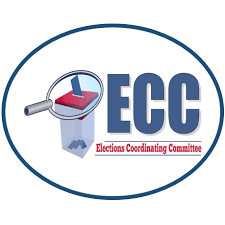Released April 6, 2023
“The ECC calls on the security apparatus to launch an immediate investigation into the
reports of harassment, intimidation and violence perpetrated by Political Actors and others in
electoral district 01, Grand Cape Mount County
This ECC preliminary update covers findings from 144 reports over 4 days of deployment
from March 21-April 2, 2023. It also contains updates on the objection and appeal processes
at the NEC Magistrates’ offices, including critical incidents observed and recommendations to
improve the process.
Overall, the ECC observed that registration centers generally opened in time and all relevant
BVR equipment were present. However, there have been reports of equipment failures and
card shortages in some centers which resulted in disruption of the process in instances such as
at the Harbel Garden School, with code 24086-Margibi electoral district 02, Gardee Town
Palava Hut, with code 09029-Grand Bassa electoral district 04 and Danielson Public School,
with code 12027-Grand Cape Mount electoral district 02. Also, some registration centers
needed uniformed security personnel. Political parties’ agents are not generally deployed to
observed the voter registration process. Further, request for proof of eligibility has not been
consistently applied by the Temporary Staff hired by NEC.
Preliminary Findings:
The ECC preliminary findings focus on key issues observed over the period of March 21 to
April 2, 2023. ECC observers reported using a comprehensive observation checklist, covering
opening, set-up, registration and closing of centers. During this period, all ECC 43 accredited
observers were permitted to observe at the NEC voter registration centers.
Opening: Consistently over the four days of deployment, ECC observers’ reports show that
120 of 144 centers observed opened on time, between 8:00 am to 8:30 am, which is 83% of
total centers observed. However, 17% of these centers opened after 8:30 am due to the lack of
electricity to power the equipment, lack of printer cartridges and cards, or late arrival of NEC
staff.
Additionally, 98% of these centers had a complete BVR kit throughout the observed days.
ECC commends the NEC for opening most of the voter registration centers on time and
having the necessary equipment during the early days of the process.
Set-up: According to observers’ reports, 122 of 145 centers were accessible to all, including
persons with disabilities or special needs, which is 84% of centers observed. However, in 23
of the centers, applicants had to use stairs to access the registration centers. Using stairs does
not create easy access for persons with disabilities and special needs.
Observers also reported 3 NEC staff present during the start-up of registration, with at least
one female serving on the team.
In 41 of 141 centers observed, the BVR equipment experienced problems during the day but
was quickly resolved; however, 15 centers experienced malfunction, causing serious delay to
the process. The BVR system was replaced in 7 of these centers.
Registration Procedure: In 97 of 141 centers observed, ECC observers reported that the
NEC registration teams asked applicants to present proof of eligibility before being registered
and in 44 of these centers, applicants were allowed to register without showing a proof of
eligibility. At the same time, 121 of 140 applicants who successfully registered fingers were
marked with the indelible ink. The inking of successful applicants’ fingers intends to minimize double or multiple registration during the process. ECC observers also reported that NEC staff in 57 of 141 centers did not serve a copy of the rejection form whenever an applicant was rejected.
ECC notes the inconsistency in the NEC registration teams’ application of the registration
procedures and encourages the NEC to debrief staff to evenly follow the procedures to
increase citizens’ trust and confidence in the process.
Closing: 82 of 143 centers observed were reported to close between 5-5:30 pm, while 46
closed before 6:30 and only ten closed after 7:30 pm. However, in 10 of these centers,
applicants in line at 5:00 pm were not allowed to register. Again, ECC calls on the NEC
Electoral Supervisors to provide adequate supervision of BVR teams and ensure that
applicants in the line at 5:00 pm can register. This is especially important as phase one draws
to a close.
Party Agents: ECC observers reported that in 113 of 142 centers observed, political party
agents were present. The data shows that Coalition for Democratic Change (CDC) and the
Unity Party (UP) had the highest number of deployed agents followed by the Collaborating
Political Parties (CPP) and others.
Security: 90 of 145 centers observed were reported to have uniformed security personnel
present throughout the day.
Objections & Appeals on Voter Registration: Like district observers, ECC trained and
deployed seven county coordinators for phase one of the BVR process who were instructed to
observe the objection and appeal processes associated with voter registration at the NEC
Magistrates’ offices. The NEC objections and appeals are intended to hear complaints filed
during voter registration. ECC observers at the registration centers only reported seven
complaints filed during the period observed primarily centered on the rejection of applicants
perceived to be underaged, foreigners and the inability to present a valid document. However,
all 7 county coordinators reported that there was no hearing held at any of the Magistrates’
offices.
Critical Incidents: Following the ECC March 28, 2023, press release, observers reported
additional incidents about the process ranging from card shortages at registration centers,
equipment failure, intimidation, and violence. The incidents reported below covered the
period of March 28-April 2, 2023, accordingly;
Equipment failure: ECC received reports of six critical equipment failure incidents during
the observed period. In some instances, this resulted in a significant delay in the process,
while in others, closure for the entire day. Below are the names, codes, and locations of the
centers affected:
● Gidson Junior & Senior High School, with code 30214- Montserrado electoral district 02
● New Life Christian Academy, with code 30169-Montserrado electoral district 11
● Kennedy Town Palava Hut, with code 09039-Grand Bassa electoral district 04
● Johnsonville Public School, with code 30036-Montserrado electoral district 02
● Fortville School, with code 09138-Grand Bassa electoral district 02 and
● Biafra Community Hall, with code 09129-Grand Bassa electoral district 03
Shortages in Printer Card and Ink: ECC received six incidents of printer card and ink
shortages. This resulted in the closure of affected centers, and applicants were advised to
return home. Notably, such incidence created tension and animosity amongst applicants at the
Danielson Public School, with code 12027-Grand Cape Mount electoral district 02, because
many had traveled from distant villages. Below are the names, codes, and location of the
centers affected:
● Jawala Community School, with code 30272-Montserrado electoral district 03
● Harbel Garden School, with code 24086-Margibi electoral district 02
● Waka Town Public School, with code 09140-Grand Bassa electoral district 02
● Gardee Town Palava Hut, with code 09029-Grand Bassa electoral district 04
● Danielson Public School, with code 12027-Grand Cape Mount electoral district 02
● Unification Pavilion, with code 09133-Grand Bassa electoral district 03
Violence & Intimidation: ECC received a critical incident of violence, harassment, and
intimidation perpetrated by Senator Simeon B. Taylor of Grand Cape Mount, Representative
Bob H. Sheriff of Grand Cape Mount electoral district 02, and Representative Hanson
Kiazolu of Montserrado District 17. According to the ECC observer’s account, Senator Taylor
was the lead perpetrator who forced one of the NEC BVR staff to open the system and show
the number of people registered. During the process, he used profanity to harass and
intimidate the NEC staff at the Varkianway Town Hall, having code 12051. According to the
ECC observer, it was a scary scene when he forced the NEC Registrar to open the system,
allowing him to view the data of applicants registered. He moved on to Juejuah Public
School, in the same district, having code 12065, where he did the same by forcing the NEC
staff to open the system, again allowing him to view the data of applicants. Also, his men
assaulted the town chief who was present during the commotion. Reasons for the rampage is
due to accusations levied by Senator Taylor that the NEC officials and the town chief were
harboring foreigners from Sierra Leone to register. State security was on the scene, who
could not control the situation.
Recommendations: ECC recommends the following based on the findings: Address each
recommendation to particular stakeholders:
NEC:
Ensure that request for proof of eligibility is consistently applied by all Temporary Staff
members.
That the phase one of the BVR be extended by a week to make up for the malfunctioning of
equipment so that all eligible voters who wish to vote to be captured in the registration roll.
That the NEC Electoral Supervisors provide adequate supervision of BVR teams, ensuring
that applicants in line at 5:00 pm can register. This is especially important as phase one draws
to a close.
Security:
That the security conducts an immediate investigation into the intimidation, violence and
harassment perpetrated by Senator Taylor and others, and to hold them criminally accountable
for their actions in order to serve as a deterrent.
Political Parties:
That during the phase two process, party agents are trained and deployed to ensure confidence
in the outcome of the final registration.
ECC Observation & Deployment Methodology:
The Elections Coordinating Committee (ECC) began observing phase one of the Biometric Voter Registration (BVR) on March 21, 2023 in all six counties1 and 36 electoral districts. ECC trained and deployed 43 long-term observers of which 36 were deployed as stationary observers at specific NEC voter registration centers within their electoral districts. ECC observers were also at NEC Magistrate offices to monitor the objections and appeals.
The ECC has employed both stationary and mobile observation methodologies to observe
the BVR process.
Stationary Observation: ECC has deployed county coordinators and district observers as stationary observers for the BVR observation. ECC district observers are observing designated voter registration
centers while county coordinators are observing the objection and appeal processes associated with voter registration at the National Elections Commission (NEC) magisterial offices. Electoral district observers must be stationary at their assigned areas for six (6) days and county coordinators for eight (8) days for the entire voter registration period. Throughout the observation, they complete a comprehensive observer checklist and send in reports via coded text messages to the ECC’s Data Center.
Mobile Observation: On non-stationary days, all ECC county coordinators and electoral
district observers are mobile, reporting any observed critical incidents. All critical incidents
submitted to the ECC Data Center are verified and confirmed by trained Data Clerks.
Observers’ reports are transmitted to the ECC reporting system using their mobile phones
through coded texts and are later analyzed to produce updates.







